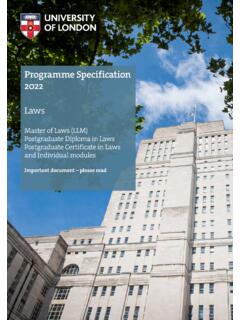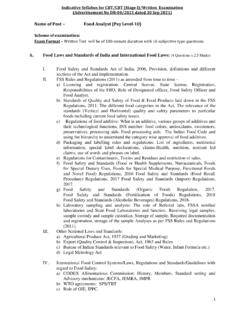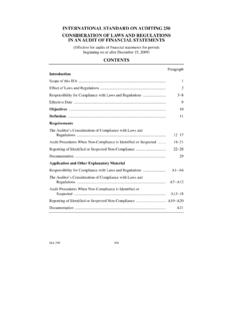Transcription of International economic law - University of London Worldwide
1 International economic law Section A: Evolution and principles of International economic law Revised version December 2006 Subedi This study guide was prepared for the University of London by: Professor Subedi, OBE, MA, LLM, DPhil (Oxon.) Professor of International Law, University of Leeds This is one of a series of study guides published by the University . We regret that owing to pressure of work the author is unable to enter into any correspondence relating to, or arising from, the guide. If you have any comments on this study guide, favourable or unfavourable, please use the form at the back of this guide.
2 Publications Office The External Programme University of London Stewart House 32 Russell Square London WC1B 5DN United Kingdom Published by the University of London Press University of London 2007 Printed by Central Printing Service, University of London All rights reserved. No part of this work may be reproduced in any form, or by any means, without permission in writing from the publisher. iii Contents Introduction 1 Chapter 1 Law and economic policy.
3 A historical overview 7 From antiquity to empires 7 From empires to modern nation states 8 The aspirations of newly independent states 11 Chapter 2 The evolution of International economic law 13 The history of economic development 14 Restructuring of the world economy 16 The dawn of the new era 17 The height of corporate power 18 The quest for a balanced system 19 Chapter 3 Fundamental principles of International economic law 21 The definition of International economic law 21 The basis of International economic law 22 economic sovereignty 22 Permanent sovereignty over natural resources (PSNR)
4 23 Fundamental principles of International economic law 24 Chapter 4 The institutional structure of International economic law 35 Institutions 35 The UN and its specialised agencies 36 21 Chapter 3: Fundamental principles of International economic law Introduction This chapter will examine the definition of International economic law, the fundamental principles of this body of law and developments in other areas of International law that have influenced the development of International economic law.
5 Learning outcomes By the end of this chapter and the relevant readings you should be able to: explain the fundamental principles of International economic law explain the importance of the economic sovereignty of states and the PSNR. Essential reading Lowenfeld, Chapters 1, 2, 11 and 22. UN Declaration on the Permanent Sovereignty of States over their Natural Resources 1962. UN Charter of economic Rights and Duties of States 1974. Rio Declaration on Environment and Development 1992. The definition of International economic law International economic law regulates the International economic order or economic relations among nations.
6 However, the term International economic law encompasses a large number of areas. It is often defined broadly to include a vast array of topics ranging from public International law of trade to private International law of trade to certain aspects of International commercial law and the law of International finance and investment. The International economic Law Interests Group of the American Society of International Law includes the following non-exhaustive list of topics within the term International economic law : (1) International Trade Law, including both the International law of the World Trade Organization and GATT and domestic trade laws ; (2) International economic Integration Law, including the law of the European Union, NAFTA and Mercosur.
7 International economic law: Section A 22 (3) Private International Law, including International choice of law, choice of forum, enforcement of judgments and the law of International commerce; (4) International Business Regulation, including antitrust or competition law, environmental regulation and product safety regulation; (5) International Financial Law, including private transactional law, regulatory law, the law of foreign direct investment and International monetary law, including the law of the International Monetary Fund and World Bank; (6) The role of law in development; (7) International tax law; and (8) International intellectual property law.
8 The basis of International economic law International economic law is based on the traditional principles of International law such as: pacta sunt servanda freedom sovereign equality reciprocity economic sovereignty. It is also based on modern and evolving principles such as: the duty to co-operate permanent sovereignty over natural resources preferential treatment for developing countries in general and the least-developed countries in particular. The sources of International economic law are the same as those sources of International law generally outlined in Article 38 of the Statute of the International Court of Justice: Article 38 (1) The Court, whose function is to decide in accordance with International law such disputes as are submitted to it, shall apply: (a) International conventions, whether general or particular, establishing rules expressly recognized by the contesting states; (b) International custom, as evidence of a general practice accepted as law.
9 (c) the general principles of law recognized by civilized nations; (d) subject to the provisions of Article 59, judicial decisions and the teachings of the most highly qualified publicists of the various nations, as subsidiary means for the determination of rules of law. economic sovereignty When states began to function as politically independent and sovereign entities, they realised that one of the most important attributes of state sovereignty was economic sovereignty. Without this, political sovereignty was not complete. Asserting economic Chapter 3: Fundamental principles of International economic law 23 sovereignty meant having control over the economic activities of both juridical and natural persons conducting business within the country, whether nationals of that country or foreigners.
10 Owing to a number of historical reasons, many states inherited on independence a situation in which foreign individuals or companies enjoyed certain concessions or privileges or control over the economic activities of the country concerned. In many states the natural resources and mining rights were controlled by foreign companies or individuals under a concession agreement entered into with the previous administration, whether colonial or otherwise. When the country concerned wished to embark on a policy of economic development, one of the first initiatives it had to take was to consider harnessing its natural resources in accordance with its economic policies.















